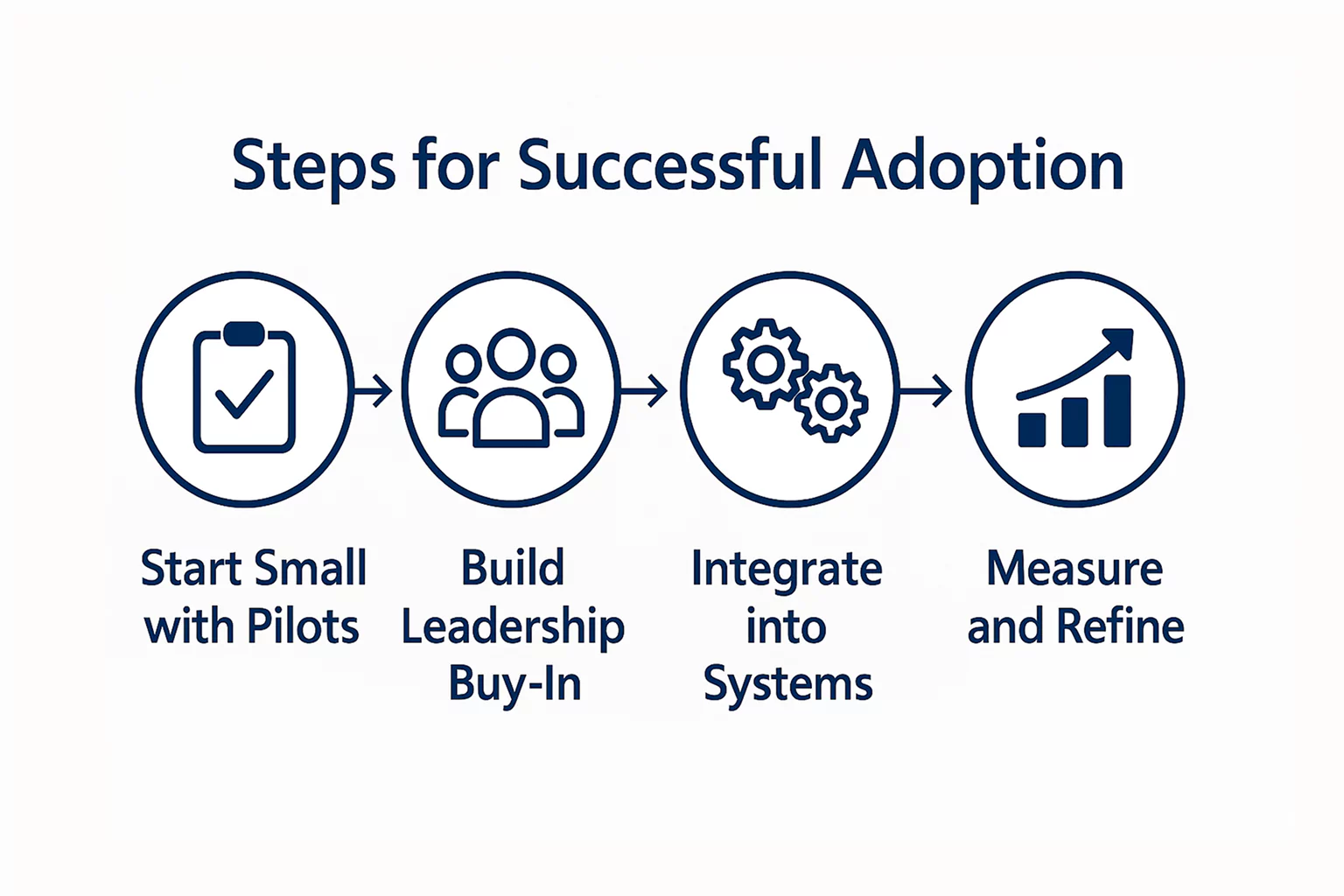Copilot for Sales Excellence: Strategies for Adoption and Impact
Why sales teams need an AI advantage
Sales is evolving fast. Buyers expect quick responses, tailored engagement, and seamless experiences across channels. At the same time, sales professionals are buried under administrative tasks that take them away from relationship-building. According to Microsoft research, sellers spend up to 66% of their time on non-selling activities such as email management and data entry.
This is where AI-driven agents like Microsoft Copilot step in. Far from being a futuristic add-on, Copilot is rapidly becoming a necessity for sales organisations that want to compete effectively. It is not about replacing sales teams with automation. It is about providing them with intelligent support that frees up their time, sharpens their decision-making, and fosters stronger customer interactions.
At ARP Ideas, we see Copilot as an opportunity to align sales operations with the realities of digital transformation. It allows organisations to reimagine how their teams work without compromising on compliance, security, or human expertise.
The business case for Copilot adoption
Every investment needs a strong justification. For sales leaders, Copilot offers measurable improvements that align with broader business objectives.
-
Productivity gains: Automating repetitive work can reduce manual tasks by hours each week, leaving more time for high-value selling.
-
Customer responsiveness: With faster access to data and AI-drafted communications, sales reps can engage customers in near real-time.
-
Improved forecasting: AI insights from Dynamics 365 CRM provide managers with more accurate pipeline visibility and better decision support.
-
Strategic alignment: Adopting Copilot supports wider transformation goals by embedding AI into core business processes.
These benefits are not theoretical. For instance, early adopters of AI-enhanced sales approaches report revenue increases in the range of 6-10% according to recent B2B sales studies, along with improvements in lead conversion rates. For decision-makers, this means that the question is less about whether Copilot delivers value and more about how to unlock it quickly and sustainably.
Key benefits with real-world impact
Copilot is powerful because it touches many parts of the sales workflow. Rather than offering isolated features, it brings intelligence into daily tasks where time and energy are often wasted.
-
Personalised communication: In Dynamics 365 Sales, Copilot can draft client-specific emails based on CRM records. This reduces time spent on writing while ensuring consistency and personalisation.
-
Meeting efficiency: Integration with Microsoft Teams means Copilot can summarise calls, capture key decisions, and generate next steps. This eliminates the risk of missed details and speeds up follow-up.
-
Process automation: With Power Platform connectors, Copilot becomes part of wider workflows, such as triggering approvals or updating records automatically.
-
Smarter forecasting: Leveraging Azure OpenAI, Copilot provides pattern recognition in sales data, offering managers early warnings on deals at risk.
The impact is practical and immediate. Imagine a sales manager reviewing the pipeline for a quarterly meeting. Instead of manually compiling data, Copilot delivers an AI-generated summary highlighting deal velocity, stalled opportunities, and suggested next actions. This saves hours and drives better coaching conversations with the team.
Adoption in practice
Consider a mid-size B2B organisation with a 50-person sales team. Before introducing Copilot, sales reps spent large parts of their week entering call notes into CRM and preparing client proposals. Managers struggled with incomplete data, which made pipeline reviews less reliable.
With Dynamics 365 Sales and Copilot, the organisation restructured its workflow:
-
Sales reps used Copilot to generate call summaries directly from Teams meetings, cutting manual note-taking by 50%.
-
Email drafting templates ensured consistent yet tailored communication, reducing the turnaround time for client responses.
-
Managers tapped into Microsoft Fabric for advanced analytics, giving them a clearer view of performance trends across teams.
Microsoft’s own experience shows sellers saved roughly 90 minutes per week and improved customer engagement after introducing Copilot.
Barriers, myths, and common objections
Adopting AI in sales can raise valid concerns. Addressing them openly helps ensure a smoother change management process.
| Concern or Myth | Reality |
|---|---|
| AI will replace human judgment | Copilot augments human expertise by handling repetitive work, allowing salespeople to focus on relationships. |
| Data security is at risk | Copilot is embedded within Microsoft’s secure cloud infrastructure, ensuring compliance and data governance. |
| Adoption is too complex | Starting with pilot projects and guided support makes integration manageable. |
| Copilot is only for large enterprises | Microsoft’s ecosystem scales effectively for mid-size organisations as well as global businesses. |
These conversations matter. At ARP Ideas, we often find that resistance fades once sales teams experience the time savings and improved insights firsthand. Transparency around limitations is essential, too: AI models still require human oversight, and organisations must plan training carefully.
Strategies for successful adoption
Technology alone will not deliver impact. Success depends on how organisations introduce and embed Copilot within their sales culture.
Step 1: Start small with pilots
Launch Copilot with a select group of sales teams. Track metrics such as time saved on admin tasks, quality of customer interactions, and user satisfaction.
Step 2: Build leadership and champion support
Identify change champions within the sales team. Encourage managers to lead by example in adopting Copilot features.
Step 3: Integrate into existing systems
Connect Copilot with Dynamics 365 CRM and Power Platform workflows. Ensure processes are designed to avoid duplication and friction.
Step 4: Measure and refine
Define KPIs such as forecast accuracy, deal cycle length, or customer response time. Use these insights to adapt adoption strategies over time.
This phased, evidence-driven approach ensures adoption is sustainable and aligned with broader transformation initiatives.

Future outlook for AI in sales
AI adoption in sales is still in its early chapters. Over the next few years, we expect:
-
Proactive engagement: Copilot will transition from reactive support to proactive deal coaching, suggesting next best actions before sales teams even request them.
-
Deeper analytics: With Microsoft Fabric, data will be unified across customer touchpoints, giving richer insights into buying behaviour.
-
Cross-platform integration: Beyond Microsoft ecosystems, AI assistants will connect to partner systems, making workflows more seamless.
Organisations that begin adoption now will not only gain immediate benefits but also position themselves to capture the advantages of future capabilities. At ARP Ideas, our role is to help clients navigate both the current opportunities and the road ahead.
Key takeaways
-
Copilot helps sales teams save time, respond more quickly, and make more informed decisions.
-
Adoption requires structured planning, leadership involvement, and ongoing measurement.
-
AI is not a replacement for human judgment but a way to amplify it.
-
Partnering with experts like ARP Ideas ensures smooth integration and real business impact.
Frequently asked questions
How quickly can Copilot be deployed in a sales organisation?
A pilot can be set up in a matter of weeks, especially for organisations already using Microsoft Dynamics 365 and Teams. Full adoption typically takes a few months, depending on the scope.
What about security and compliance?
Copilot operates within Microsoft’s secure cloud framework, inheriting enterprise-grade compliance and governance features. Sensitive data remains protected.
Does Copilot integrate with non-Microsoft systems?
Yes, through Power Platform connectors and APIs, Copilot can connect to third-party tools; however, planning is necessary to ensure a smooth integration.
How does Copilot affect sales managers compared to sales reps?
Reps benefit from time savings and automation, while managers gain better visibility into pipelines, team performance, and forecasting accuracy.
Conclusion and next step
The path to sales excellence is not about working harder but working smarter. Copilot provides sales teams with the intelligence and automation they need to focus on what matters most: building relationships and closing deals.
At ARP Ideas, we combine technical expertise with real-world adoption strategies to help organisations achieve measurable impact. If you are ready to explore how Copilot can transform your sales operations, get in touch with our team today and start your AI adoption journey.


